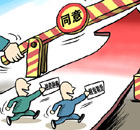Opinion
China's govt purchase rule self-improvement rather than self-protection
(Xinhua)
Updated: 2009-12-19 13:45
 |
Large Medium Small |
For years China has been labeled as "world factory" which churns out cheap and low value added goods and the country was frequently criticized as lacking in innovation. But its latest move to promote innovation received unexpected reactions.
China said last month that to encourage innovative activities, it would give priority to goods with Chinese intellectual property or have trademarks registered in the nation in government purchase.
The decision sparked opposition from 30 business groups from United States, European Union and other nations, who claimed that the regulation was "onerous and discriminatory", and violated China's commitments to resist protectionism.
Before the new rules were published, the Chinese government had spelled out that products that were developed in China, no matter supported by foreign investment or not, should be regarded as "made in China."
"It is appropriate for the Chinese government to take these policies in transition from 'made in China' to 'created in China', " spokesman of the Ministry of Commerce Yao Jian told reporters at a briefing on Wednesday.
He also made it clear that the new rules aimed to treat all companies set up in China, both domestic- and foreign-invested, "equally."
It is above reproach that China spends its own money to encourage industrial innovation and improve its competitiveness. The self-improvement measure should not be translated into self-protection.
Few people would disagree that every government has the right to decide how it would spend taxpayers' money. To spend part of the money on domestic-developed products is a common practice in the world and China should not be an exception.
Although the new rules which cover computers, communications devices, software, and new energy products could affect deals worth billions of US dollars, government procurement, as spokesman Yao has put it, is only part of the Chinese market and the rest of it is big enough for companies to enjoy.













